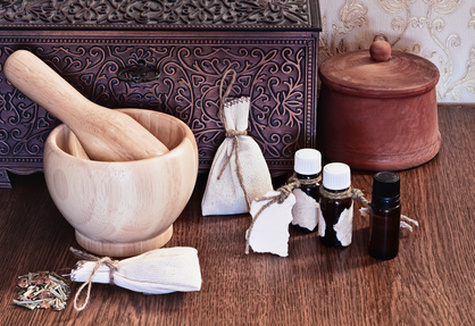Is there a difference between homeopathic and holistic? There definitely is. Homeopathic is a specific remedy or treatment sometimes used by holistic medicine practitioners. Like acupuncture or other medical models, it is also a specific approach to health care or wellness—treating disease and illness with “like substances” (See below). Holistic medicine is a different philosophy or approach to health that focuses on the balance of the body’s systems—body, mind, soul, and while it may involve the use of homeopathic remedies, the primary focus is on nutrition, exercise, attitude, and environmental influences.
What is homeopathy?
Homeopathy is a system of alternative medicine remedies based on the belief that the body can heal itself. The remedies were developed in 1796 by Samuel Hahnemann, around the same time vaccination was being explored. Homeopathy is based on his doctrine of “like cures like.” Hahnemann claimed that the substance that causes the symptoms of a disease in healthy people could cure similar symptoms in sick people. In other words, by using something that brings on symptoms in a healthy person can—in a very small dose —a practitioner can treat an illness with similar symptoms. This is meant to trigger the body’s natural defenses.


Does Homeopathy Work?
According to more and more officials and medical experts and scientific studies, homeopathy does not work, and can indeed do harm if used when proven medical remedies had been used instead.
Yet, according to the Homeopathy Institute, “Worldwide, over 200 million people use homeopathy on a regular basis. Homeopathy is included in the national health systems of a number of countries e.g. Brazil, Chile, India, Mexico, Pakistan, Switzerland, United Kingdom. According to the National Institutes of Health, over 6 million people in the United States use homeopathy, mainly for self-care of specific health conditions.”[1]
The 2011 Swiss report, https://www.hri-research.org/resources/homeopathy-the-debate/the-swiss-hta-report-on-homeopathy/ compiled on behalf of the Swiss Federal Office for Public Health presented the findings of a seven-year review of the evidence on homeopathy. It concluded that homeopathy, as practiced in Switzerland, is clinically effective, cost-effective and safe. Homeopathy has since become available to the Swiss public as part of their national healthcare scheme. In 2004, Germany, where homeopathy began, pulled reimbursements for homeopathic treatments. Regulations around homeopathy vary in other parts of Europe, depending on the country. Some homeopathic treatments are covered by the national insurance of several European countries, including France, but other countries, such as Belgium and the Czech Republic, refuse to cover it. In Austria, public insurance requires scientific proof of effectiveness in order to reimburse medical treatments, but exceptions are made for homeopathy. [2]
How Does Homeopathy Work?
Homeopathy is based on rigorous dilutions and mixing, called successions. The toxin or ingredient is weakened by homeopathic doctors who add water or alchol to the ingredient. For instance, red onions cause the eyes to water. So, for an allergy solution red onion is mixed with 10 parts water or alcohol and shaken. Then one part of that mixture is taken and added to another 10 parts of water or alcohol. This process is repeated 30 times. This mixing is part of a process called “potentization.” This is the process homeopaths believe transfers the substance’s healing essence. The lower the dose, they say, the more powerful the medicine.
A typical homeopathic dilution is 30X, where the X represents 10. This dilution level is printed on the bottle of medicine. Homeopathic remedies come in a variety of forms, like sugar pellets, liquid drops, creams, gels, and tablets.
Is Homeopathy Safe?
The FDA (Federal Drug Administration) does oversee homeopathic remedies. But it doesn’t check to see if the remedies are safe or effective. In general, most are so watered down that they don’t cause any side effects. But there are exceptions, says WebMD. Homeopathic medicines can contain a large amount of an active ingredient, like a heavy metal, that can be dangerous. Case in point: In 2016, the FDA issued a warning against using homeopathic teething tablets and gels because of possible health risks to infants and children.[3]
According to the National Center for Complementary and Alternative Health (NCCAH), as with any medication or supplement, there are some risks:
- A 2007 systematic review found that highly diluted homeopathic remedies, taken under the supervision of trained professionals, are generally safe and unlikely to cause severe adverse reactions. However, like any drug or dietary supplement, these products could pose risks if they are improperly manufactured (for example, if they are contaminated with microorganisms or incorrectly diluted).
- A 2012 systematic review of case reports and case series concluded that using certain homeopathic treatments (such as those containing heavy metals like mercury or iron that are not highly diluted) or replacing an effective conventional treatment with an ineffective homeopathic one can cause adverse effects, some of which may be serious.
- Liquid homeopathic remedies may contain alcohol. The FDA allows higher levels of alcohol in these remedies than it allows in conventional drugs. [4]
What is Holistic?
Holistic means “whole.” It is not a remedy or medicine, but a philosophy or practice, an approach to health care. A practitioner with a holistic approach treats the symptoms of a disease or illness as well as looking for the underlying cause or what created the illness. Holistic medicine also attempts to prevent illness by placing a greater emphasis on optimizing health – the body’s natural state is one of health. An illness or disease is viewed as an imbalance in the body’s systems. Holistic therapies tend to emphasize proper nutrition and avoidance of substances—such as chemicals—that pollute the body.Holistic medicine is the art and science of healing the entire person—body, mind, and soul, through the use of alternative medical approaches—like homeopathy, massage, diet, nutrition, exercise, and supplements. Although it is primarily an approach used by Naturopaths, and other alternative medicine doctors, more and more allopathic, or conventional doctors are beginning to use a holistic approach in their practices as well. When anyone, doctors, patients, or alternative practitioners use a combination of alternative and holistic medicine the practice is called CAM, or Complementary and Alternative Medicine.


Does Holistic Work?
A Holistic approach to health care does work, from both a scientifically proven model to an anecdotal model. There are too many studies, research, and too much evidence to even suggest it doesn’t. Medical research has proven that treating any part of the human system, physical, mental, emotional, or spiritual, affects the entire system. Remove a work or life stressor and physical, mental, and emotional systems are impacted. Treat physical pain and the mental, emotional and even spiritual systems are impacted. Conventional medicine may give a patient an aspirin for a headache and assume only the headache pain is impacted, but in reality, other systems throughout the body are affected as well.
Change the nutrition the body receives and in almost all cases an entire system-wide change occurs, on a physical, mental, and emotional level. Approaching health care from a holistic foundation is an excellent approach to ensuring all your body’s systems—mental, emotional, physical, and spiritual stay balanced.
How Does Holistic Work?
Holistic medicine is actually how all medicine used to be practiced—the physcian would spend time with his/her patients, listening to the patient describe their symptoms, learning about their life, their work, their stresses, family, attitudes, beliefs, and anything that might contribute to their disease or sickness. Chinese medicine still treats patients like this, but conventional medicine rarely spends more than 10-15 minutes doing an intake on a patient.
Holistic medicine focuses on diet and nutrition, exercise, and alternative approaches to health. The focus is on optimizing health, more than on treating disease processes. By ensuring the body, mind, and soul are balanced and healthy, holistic medicine believes the body will heal itself and bring all the systems back into balance.
Is Holistic Safe?
Holistic medicine is very safe for informed, aware consumers. Because holistic medicine tends to focus on nutrition and exercise, not pills and chemicals, there is little about it that is unsafe, until people, both practitioners, and patients, assume that if a little is good, more is better. Vitamins and supplements are still very powerful substances and too much, too many, or the wrong combination can harm you. So yes, “Holistic Medicine,” the practice of balancing body, mind, and soul is healthy and beneficial. However, at the end of the day patients and practitioners must still understand that alternative medicine is not regulated and when there is a problem with a supplement or treatment the FDA (Food and Drug Administration) is not going to be there to alert consumers because they don’t regulate that industry.
What is the difference between holistic and homeopathic?
When people think of “holistic medicine,” they may associate the term, or use it interchangeably with homeopathic remedies. The two are distinctly different—since homeopathic refers to a specific health modality and holistic refers to a specific type of health and wellness approach. A holistic practitioner attempts to prevent illness and optimize wellness by placing an emphasis on keeping the body’s entire state—body, mind, and soul—in balance. When all a body’s systems, including one’s diet, emotions, attitude, lifestyle, environment, and mind are in balance the patient is “healthy” or “well,” because the body self-heals when given the chance.
Holistic doctors or practitioners may use homeopathic remedies as part of their treatment process, but they tend to emphasize proper nutrition and the avoidance of substances, like conventional medicines and chemicals, or poor nutrition, that can pollute the body.


Holistic vs Homeopathic Health Care?
Should you seek a conventional, holistic or homeopathic practitioner? It’s up to you and is dependent on your health goals and needs. Before you decide, determine what your goal for your health is. Do you have a disease or health condition that needs attention now, or do you simply want to “feel better” overall, or are you interested in preventive care—heading off any disease process before it starts? If you’re dealing with something immediate, then homeopathic might be a good place to start. Or, you could consult with a holistic doctor first to see if they have a better or alternative recommendation based on their assessment of your problem. FInding a good practitioner:
- Whether you use a holistic or homeopathic practitioner they should be willing to work together with your conventional health care providers. If you don’t use conventional health care, they should still work with any health-related practitioners you do work with—whether it’s a dietician, nutritionist, massage therapist, or acupuncturist. It’s important for all the professionals involved in your health to communicate and cooperate so your health is optimized. Some processes and practices may conflict with, or not be compatible with other treatments or remedies. By keeping your providers informed of what role each plays, and what they’re advising, you can protect yourself and possibly enhance your healing as well. For example, for example, if you have glaucoma, some yoga poses may not be safe for you.
- Explain all of your health conditions to the practitioner. Just because you think your massage therapist simply makes your aching muscles feel better, the fact is, massage can be a type of medical treatment. It stimulates blood flow, moves lymph fluid around, and can lead to a variety of changes in the body. Not everyone should have massage—like pregnant women, or people taking blood thinners etc.. By keeping all of your practitioners informed they can advise you about which treatments work with each other, and which don’t.
- What is the practitioner’s training and experience in working with people who have your conditions? Even if your health care goal is general well-being or overall health, choose a practitioner who understands how to work with people with your specific needs—whether it’s aging issues, allergies, fatigue, headaches or even cancer or more serious diseases. Certain health conditions can affect the safety of complementary approaches so it’s important for everyone involved in your health care treatment understand what each practitioner is doing.
- WIll your health insurance cover your treatment? Insurance plans vary and not all of them cover complementary or alternative health care approaches. Contact your health insurance provider and ask.
[1] https://www.hri-research.org/resources/essentialevidence/use-of-homeopathy-across-the-world/
[2] https://www.chantryhealth.com/evidence-for-homeopathy/
[3] https://www.webmd.com/balance/what-is-homeopathy#1
[4] https://nccih.nih.gov/health/homeopathy
